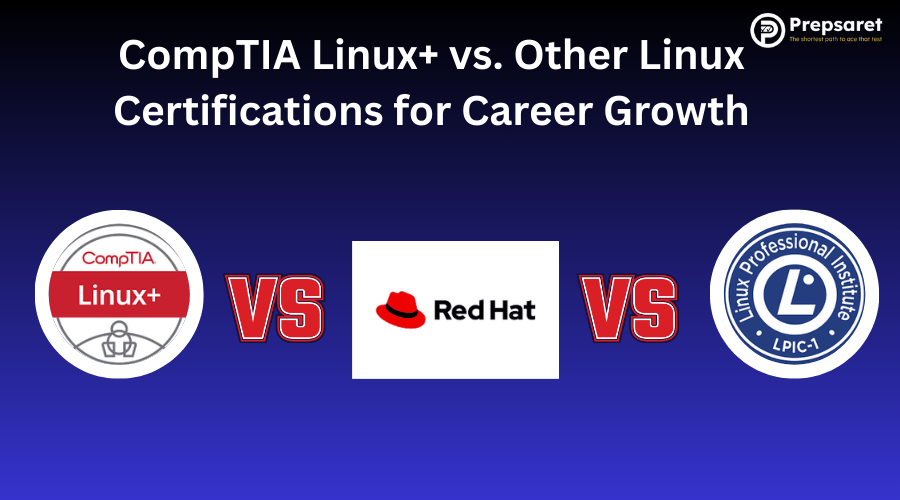So, you’ve heard about the CompTIA Linux+ certification, right? Maybe your boss dropped it in a meeting, or maybe you just stumbled across it while Googling “how to break into IT.” Either way, you’re curious: What jobs can you actually get with CompTIA Linux+ certification?
Good question—and you’re in the right place. Let’s break it down in a way that’s simple, friendly, and yes… a little fun.
The CompTIA Linux+ certification is designed to prove one thing: you know your way around Linux. And in today’s IT world, that’s a huge deal.
With Linux+ under your belt, you show employers that you can manage, troubleshoot, and secure Linux systems like a pro.
Even better, this certification opens the door to a wide range of career paths—from entry-level Linux jobs to advanced roles in cloud engineering and DevOps.
Let’s dig into why Linux+ is so valuable, how Prepsaret study resources can help you attain it, and more importantly, what jobs are waiting for you once you earn it.
Understanding the Value of CompTIA Linux+ Certification in IT Careers
Think of CompTIA Linux+ as your official Linux driver’s license. It covers the essentials of Linux system administration—things like installing and configuring systems, managing users, setting permissions, running backups, and securing data.
It also puts a strong focus on troubleshooting, because let’s be honest, IT life is 50% fixing things that broke yesterday and 50% preventing them from breaking tomorrow.
The cool part? This isn’t just another piece of paper. CompTIA certifications for IT careers are some of the most respected in the industry. When employers see “Linux+” on your résumé, they know you didn’t just Google a few commands—you actually have hands-on skills.
And with Linux powering everything from open-source technologies to cloud servers on AWS and network appliances in Fortune 500 companies, the demand for Linux-savvy pros isn’t slowing down anytime soon.
Read on: CompTIA Linux+ Exam Objectives
Why Employers Value Linux+ Skills in Modern IT
Here’s a little secret: Linux is everywhere, even if you don’t see it. That social media app you scrolled this morning?
Probably running on a Linux server. The company email system? Very likely Linux-powered. Cloud platforms like AWS, Azure, and Google Cloud? Yup, Linux at the core.
Employers love candidates with Linux+ certification because it tells them you can:
- Configure and maintain Linux systems.
- Troubleshoot issues without panicking.
- Keep systems secure in a world where cyber threats never take a day off.
And because Linux is a big player in DevOps pipelines, IT infrastructure management, cloud computing, and network administration, your certification signals to employers that you’re not just book-smart—you can roll up your sleeves and contribute from day one.
Entry-Level IT Jobs You Can Get with CompTIA Linux+ Certification
Now, let’s get to the good part: the jobs. CompTIA Linux+ jobs are a fantastic launchpad for anyone entering IT. Think of these first roles as your stepping stones—they give you the experience and credibility to climb the ladder to more specialized, higher-paying positions.
IT Support Specialist and Help Desk Roles
Picture this: you’re the hero who gets the call when something stops working. As an IT support specialist or Help Desk Technician, your day might include troubleshooting Linux desktops, monitoring servers, and answering frantic “why won’t this work?!” messages from co-workers.
With IT jobs with Linux+ certification, you’ll have the skills to calmly dive in, check logs, solve problems, and keep everything running smoothly.
These roles may start at the ground floor, but they’re a fantastic entry point into IT. Many professionals use them as a springboard into Linux Administrator jobs, network administrator positions, or even cybersecurity.
Junior Linux System Administrator Opportunities
Here’s where things get even more exciting. As a Junior Linux system administrator, you’re not just fixing problems—you’re running the show behind the curtain. Your responsibilities might include:
- Managing Linux servers.
- Creating and managing user accounts.
- Performing system backups.
- Handling security updates and patches.
This is where your Linux+ skills really shine, because the certification proves you can manage the daily operations of Linux systems without needing someone to hold your hand.
From here, the natural career growth path leads to Linux Administrator jobs, Linux Systems Engineer, or Senior Administrator roles, where both the responsibilities and Linux Administrator salary grow significantly.
Mid-Level Linux+ Certification Job Roles and Career Paths
Once you’ve moved beyond entry-level positions and gained a solid 2–5 years of experience, your Linux+ certification careers really start to expand.
The CompTIA Linux+ certification signals to employers that you’re ready for bigger challenges and more responsibility in complex IT environments. Here are some of the most common Linux+ certification job roles and what they involve:
- Linux Systems Engineer – Focuses on optimizing servers for performance, ensuring applications run smoothly, and handling large-scale upgrades or migrations.
- Network Administrator – Uses Linux+ skills to integrate routers, switches, and firewalls, keeping the network fast, secure, and reliable.
- Security Specialist – Protects systems against cyber threats, monitors for vulnerabilities, and implements defense strategies to keep critical infrastructure safe.
These career paths usually come with expanded responsibilities—like server optimization, system integration, and enterprise-level security management. With Linux+ under your belt, you’ll have the credibility to step confidently into these roles.
Best Jobs with CompTIA Linux+ Certification in Cloud and DevOps
Linux isn’t just about servers tucked away in old-school data centers anymore—it’s the heart of modern IT, especially in cloud computing and DevOps.
Companies rely on Linux to power their cloud platforms, run containers, and automate workflows. With a Linux+ certification, you’ll have the skills employers want for some of the fastest-growing jobs in tech.
Here are a few of the top roles you can land:
- Cloud Engineer / Cloud Administrator – Focuses on managing cloud environments like AWS, Azure, or Google Cloud. You’ll handle tasks such as provisioning servers, monitoring performance, and keeping applications online.
- DevOps Engineer – Blends development and operations. You’ll be building automation pipelines, deploying code, and using tools like Docker and Kubernetes to keep software delivery fast and reliable.
- Site Reliability Engineer (SRE) – Ensures that large-scale systems run smoothly. Think of this as the guardian of uptime—monitoring, automating, and solving problems before they cause downtime.
These roles are in hot demand, and your Linux+ certification is proof that you can handle the tools and environments that keep today’s tech world running.
Find out: How Long Does it Take to Study for CompTIA Linux+?
CompTIA Linux+ Salary Expectations Across Different Job Roles
Let’s be real—salary matters. Knowing what you can expect helps you plan and gives you motivation while you study. With Linux+ certification, salaries can vary depending on experience, job title, and even where you live. But here’s a snapshot of what’s out there.
Average Pay for Linux Administrators and Engineers
When planning your career, it helps to know what kind of paycheck you can expect. While salaries vary based on experience, location, and company size, here’s a breakdown of average pay for common Linux+ roles:
- Linux Administrator salary: Typically earns between $70,000–$85,000 per year.
- Systems Engineer: Often makes around $85,000–$100,000 annually.
- Cloud Engineer / Cloud Administrator: Can expect a CompTIA Linux+ salary close to $90,000.
- DevOps Engineer: Frequently earns $100,000 or more, especially in high-demand markets.
These aren’t just random figures—they highlight how the best jobs with CompTIA Linux+ certification can boost your career, validate your skills, and open doors to higher-paying opportunities.
Related blog post: CompTIA Linux+ Salary
Linux+ Certification Careers in IT Infrastructure and Network Administration
If you enjoy keeping systems stable and running smoothly, IT infrastructure and networking could be your sweet spot.
Roles like Infrastructure Engineer, network administrator, and IT Operations Specialist rely heavily on Linux skills. Your job might include setting up and maintaining servers, configuring networks, troubleshooting performance issues, and monitoring system health.
The beauty of the Linux+ certification is that it prepares you for exactly these kinds of responsibilities. Employers see it as a stamp of approval that you can handle the backbone of their IT environments and open the door to many Linux career opportunities.
Top Linux+ Prep Resources
Let’s be honest: passing the CompTIA Linux+ exam isn’t a walk in the park. It takes dedication, practice, and the right tools. The good news? With the right prep resources, you can feel confident and ready on exam day. Here’s how to structure your study plan:
- Start with official guides and trusted books – CompTIA’s official study guide is a must, but supplement it with highly-rated Linux+ books to deepen your understanding.
- Practice with simulated exams – Prepsaret is known for offering up-to-date practice exams, hands-on labs, and detailed explanations that align closely with the actual Linux+ exam objectives.
- Leverage online courses – Both free and paid platforms offer structured lessons, video tutorials, and interactive labs to keep you engaged while building your skills step by step.
- Get hands-on with labs – Theory is great, but Linux is best learned by doing. Set up a personal server, experiment with command-line tools, and run real-world troubleshooting exercises.
- Tap into communities – Join online groups like “what jobs can you get with CompTIA Linux+ certification Reddit,” CompTIA forums, or Discord study channels. Learning with peers can make tough concepts easier (and more fun).
How to Get a Job with CompTIA Linux+ Certification: Practical Steps
You’ve passed the Linux+ exam—congratulations! Now comes the fun part: turning your certification into a real-world job. This step can feel overwhelming at first, but if you break it down into manageable actions, it becomes much easier. Here’s a roadmap to get you started:
- Polish Your Résumé: Highlight your CompTIA Linux+ certification front and center. Be sure to include hands-on experience too—even if it’s from personal projects, homelabs, or practice labs.
- Gain Practical Experience: Don’t stop learning once the exam is over. Build a homelab, take on internships, or even volunteer to help small businesses or nonprofits with their IT needs. These experiences show initiative and give you stories to share in interviews.
- Network Like It’s Part of the Job: Connections matter. Join professional communities on LinkedIn, dive into IT forums, and attend local tech meetups. Many Linux+ certified professionals land their first big role thanks to networking rather than cold applications.
- Prep for Interviews: Be ready to explain how you’d troubleshoot a server issue, secure a Linux system, or streamline processes with automation. Confidence in interviews comes from practice—and from staying sharp with ongoing study.
Whether you’re searching “what jobs can you get with CompTIA Linux+ certification in USA” or “what jobs can you get with CompTIA Linux+ certification near me,” these steps are universal for breaking into the field.
Try this out: CompTIA Linux+ Free Questions
CompTIA Linux+ vs. Other Linux Certifications for Career Growth
If you’re comparing certifications, you’re probably wondering: “Why Linux+ over others?”
The CompTIA Linux+ vs other Linux certifications for jobs debate usually comes down to flexibility. The Linux+ is vendor-neutral, which means it’s not tied to a single company like Red Hat or SUSE.
This makes it perfect for entry-level IT jobs with Linux+ certification and mid-level professionals who want a broad, practical certification.
Now, if you’re aiming specifically for a Red Hat environment, the RHCSA might be more useful. Similarly, LPIC-1 or Linux Foundation certifications can be great stepping stones for those targeting advanced or specialized roles.
Think of Linux+ as your flexible starting point. It gives you a strong foundation, and once you’re in the field, you can always add specialized certifications to grow your career.
So, is CompTIA Linux+ worth it for IT careers? Absolutely. It not only validates your skills but also sets you up for some of the best-paying roles in IT. And if you’re asking “What salary can you earn with Linux+ certification?”—the numbers clearly show it’s a career booster.
What Jobs Can You Get with CompTIA Linux+ Certification?: FAQs
Is Linux+ Entry Level?
Linux+ is considered an entry-level certification designed for individuals new to Linux or with limited experience.
It covers foundational Linux skills such as command line usage, system installation, configuration, and basic networking, making it a strong starting point for a career in Linux system administration.
What Jobs Can I Get With a CompTIA Certification?
CompTIA certifications qualify individuals for various IT roles, including network engineer, security analyst, cloud engineer, systems administrator, and IT support specialist.
These certifications validate a wide range of skills across networking, security, and systems management, enhancing job prospects in IT.
Is Linux+ Hard to Get?
The Linux+ certification requires understanding a wide range of Linux skills such as installation, configuration, troubleshooting, and security fundamentals.
While it requires dedicated study and some hands-on practice, it is generally considered manageable with proper preparation and is not overly difficult for motivated learners.
Is Linux in Demand in 2025?
Linux expertise remains highly in demand in 2025. Its extensive use in servers, cloud environments, network infrastructure, and cybersecurity fields keeps job opportunities abundant for Linux-certified professionals in multiple regions and industries.
Is Linux a High Paying Job?
Linux-related roles tend to offer competitive salaries. Median earnings for jobs such as Linux administrator and engineer range approximately from $86,000 to $99,000 annually, with potential for higher pay depending on experience, specialization, and location.




